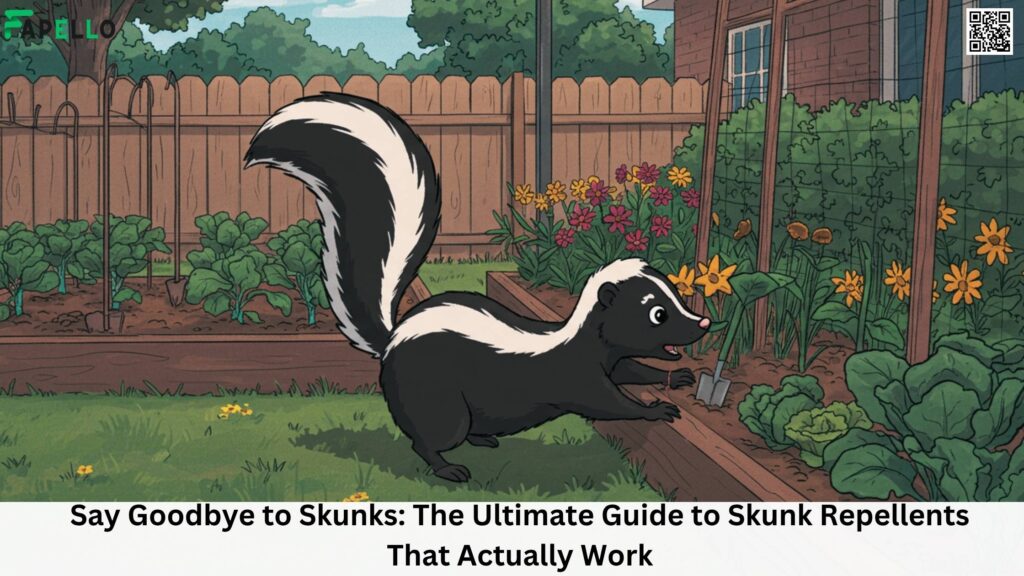Skunks may be darling from a distance, but if they have decided to call your back yard home, you know how perhaps-unwelcome—and especially smelly—a close experience with them can be. From wrecking your lawn to making your pet smell like a disaster, nuisance animals can quickly take over — so it’s time to reclaim your space.
Growcycle provides some of the best skunk repellents to naturally protect your yard and home. Constructed with safe, nontoxic ingredients, and designed to work instantly, skunks simply see it and they won’t go there! Whether you are a home gardener or pet owner, or just someone who is fed up with the smell, we offer you a dependable, environmentally friendly option for your skunk problem without causing harm to the environment or beneficial wildlife.

This guide outlines the most effective skunk repellents so you can prevent these stinkers from taking over your property — safely and without damaging your costly property or the environment.
Why Do Skunks Come Around in the First Place?
Before you can go about getting rid of skunks, you need to learn what draws them to your property. Skunks are nocturnal omnivores, with a keen sense of smell and a taste for grubs and other potential insect pests. Here’s what usually draws them into your yard:
- Food: Those that are especially fond of grubs and not very choosy about their diets in general also love pet food, birdseed, compost, garbage and fallen fruit.
- Shelter: Skunks prefer dark, hidden areas such as crawl spaces, beneath decks, wood piles, or sheds.
- Water: Just a birdbath or dripping hose will do, but there should be something.
Eliminating these attractants is the first step toward effective skunk control. But if they’re already on your property, it’s time to bring out the repellents.
Natural Skunk Repellents: Safe, Simple, and Effective
If you are searching for a natural way to keep skunks at bay, look no further. There are many natural skunk repellents that you can make that are safe for the environment.
1. Hot Pepper Spray
Skunks will not tolerate strong and spicy smells. And you can make a homemade spray from:
- 1 quart of water
- 1 chopped onion
- 1 chopped jalapeño or cayenne pepper
- 1 tablespoon of dish soap
Boil 20 minutes, drain and add the dish soap onion and pepper onion pepper water dish soap water. Spray around your yard, garden beds and entry points.
2. Ammonia-Soaked Rags
Other common forms of deterring skunks include soaking rags, foliage, cotton balls, or otherwise with ammonia, and placing these by entry points. The odor resembles that of predator urine, which makes skunks feel threatened. Just watch out if you have pets or kids – ammonia can be irritating.
3. Citrus Peels
Skunks, surprisingly, don’t like the odor of citrus either. Spread orange, lemon and lime peels about your garden or around your compost pile. It’s a safe, pet-friendly way to help keep them away.
Commercial Skunk Repellents: What Works Best?
If you’re seeking to avoid the do-it-yourself route, or you need a more potent solution, there are a number of commercially available skunk repellent products that take the stink out of life.
1. Granular Repellents
There are granules with all-natural ingredients like peppermint oil, garlic or capsaicin that can be spread throughout your property. They’re rainproof and last longer than sprays.
Look for all-natural, non-toxic brands that are safe for pets and gardens.
2. Ultrasonic Devices
These motion-sensor units broadcast high-frequency noises that offend skunks while remaining inaudible to us. Many models also blink lights to deter animals.
Position ultrasonic repellents around entry ways, garbage bins and under your deck to increase the effect.
3. Motion-Activated Sprinklers
A humane and surprisingly effective solution, these sprinklers blast skunks with water when they detect motion—sending them running without harm.
Long-Term Prevention: How to Make Your Yard Skunk-Proof
One thing is to repel skunks and the other is to prevent its reappearance. Follow these tips to make your home as unattractive as possible to these smelly invaders.
1. Secure Trash and Food Sources
- Use animal-proof garbage cans with tight lids.
- Feed pets indoors or take up food bowls after feeding.
- Sweep up fallen fruits, nuts or birdseed daily.
2. Eliminate Shelter Spots
- Block crawl spaces, decks and sheds with hardware cloth or fencing.
- Store firewood and lumber off the ground.
- Backfill any holes, burrows, or vacated dens.
3. Light It Up
Skunks are nocturnal and prefer darkness. Installing motion-activated lights around your yard can make them feel exposed and encourage them to move on.
Skunk Repellent Myths You Should Avoid
Not everything you read on the internet concerning skunk repellents is accurate. Let’s bust a few common myths:
- Mothballs work: False. Mothballs are poisonous and not very effective in deterring skunks.
- Human hair scares them off: There is little evidence that this consistently works.
- Trapping is the best solution: In many places, trapping and relocating wildlife is illegal without a permit — and it only addresses the symptoms, not the root cause.
Remember to only use safe, humane, and legal tactics when managing wildlife.
When to Call a Professional
If you’ve exhausted every remedy and still have a persistent skunk problem, it might be time to consult with a wildlife control professional. The following are signs that it is time to seek professional help:
- Skunks have made a den under your house.
- You observe that a resident is up during the day, which may mean that they’re ill.
- Too many sprays on your pets or there’s a constant odor.
Licensed professionals can safely take away skunks and assist you in skunk-proofing your home for the future.
FAQs
Q: What smells do skunks hate the most?
A: Skunks are deterred by strong odors, such as ammonia, citrus, garlic, cayenne pepper and animal urine. These smells ruin their feeling of security and send them packing.
Q: Are skunk repellents safe for pets?
A: Most natural repellents, such as citrus or pepper spray, are pet subdermal fat vs sc fat in small amounts. But do be careful with ammonia or commercial products — always read the label first for any safety instructions.
A: Search for signs like small holes, paw prints, droppings, or a continued musky smell. You might have some rustling during the night as well.
Final Thoughts
Skunks are part of nature, but they don’t have to be part of your yard. By knowing what lures them to your yard, using solutions to naturally (or commercially) keep them away and securing your space, you can humanely and effectively show skunks the door. Your home and garden can be odor-free and safe again, with a little effort.
Source: https://fapello.org.uk/






